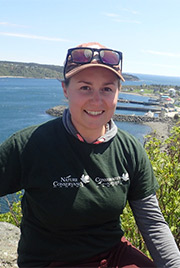Invasive species: A battle worth fighting
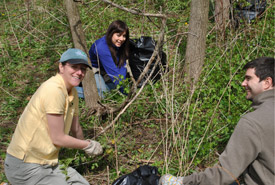
NCC staff members remove invasive garlic mustard from the Happy Valley Forest, Ontario (Photo by NCC)
Invasive species have developed a bad reputation, and for good reason: these nasty organisms wreak havoc on natural ecosystems, outcompete native species, threaten human health and cost us billions of dollars every year. They are the second greatest threat to biodiversity, after habitat loss. Invasive species are a major global problem, and in many cases, we don’t even know where to start.
To make it worse? We are to blame.
As the number of people travelling around the world grows, the spread of species into areas outside of their native range increases. Many invasive species, such as ornamental plants, were intentionally introduced. Others hitched a ride, such as rats and insects. With increased globalization, migration, immigration and the international movement of goods, invasive species can spread more rapidly than ever before.
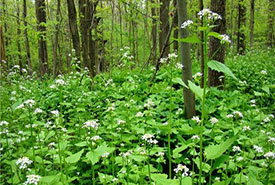
Invasive garlic mustard can take over forests, harming native understory species (Photo by NCC)
The main problem is that invasive species often flourish in new environments, because their usual predators, diseases or competitors that keep their populations in check are no longer present in the new area. Without these controls, invasive species are able to thrive and cause me quite the headache…
No, I’m not allergic to invasive species. I’m researching them.
This past summer, I had the wonderful opportunity to return to the Nature Conservancy of Canada (NCC) as the Dr. Bill Freedman Science in Conservation intern. As part of my internship, I studied invasive species of Atlantic Canada. My goal was to help identify those of highest conservation concern and how NCC can best concentrate its management efforts. Invasive species are a major threat to the natural areas we strive to protect, and require careful consideration and planning.
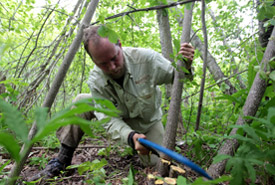
Conservation Volunteer Dave Young helps remove glossy buckthorn, Pugwash River Estuary, Nova Scotia. (Photo by Mike Dembeck)
The problem is that managing invasive species can be extremely time-consuming and costly, and it doesn’t always work. Some days I find myself asking, “Why do we even bother? Is this a lost cause? Does it even make a difference?”
I know I’m not alone in questioning the value of managing invasive species, and there is much debate over the most appropriate management strategies. While it is all too easy to get bogged down in these debates, they miss the real issue: this planet is experiencing biodiversity loss at an alarming rate, and invasive species are one of the key threats. We need to take action however we can. For me, that means helping NCC study invasive alien species and their management to make educated decisions based on the best available science.
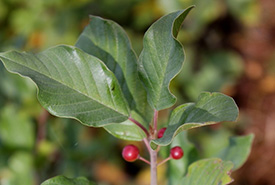
Glossy buckthorn (photo by Calin Darabus)
Managing invasive species means preparing for high levels of uncertainty about whether our actions will have impact and being prepared to adapt conservation actions to future scenarios. This is not a battle easily won, and it will require a long-term commitment to see positive results. If we want to retain natural diversity, we have protect it from threats such as invasive species. Any help I can provide in the fight is worth the headache.
How to help
One of the key steps in managing any invasive species is preventing new invasions or further spread. Here are five ways you can help tackle the spread of invasive species:
Don’t move firewood
Transporting firewood can spread invasive insects and diseases to new areas, putting our forests at risk. Buy your firewood where you plan to burn it — avoid giving pests a free ride!
More information about invasive species and firewood is available here.
Clean your gear
While I’m pretty sure nobody finds scrubbing muddy boots or washing bike tires fun, it’s really important in the battle against new invasions. Invasive plant seeds spread easily by sticking to clothes and boots. Invasive aquatic species also love to latch on to recreational gear and boats.
Inspect and clean your equipment before you head out on your next adventure.
Plant native species in your garden
Many invasive plants started out in someone’s garden. Plants sold at garden centres often are not native to Canada, and some of these can be extremely invasive or downright nasty if they spread into natural areas. Avoid starting new invasions by selecting regionally native species and disposing of any highly invasive fugitives hiding out in your garden.
Help out at an NCC Conservation Volunteers event
Help us tackle invasive species by attending an NCC Conservation Volunteers event near you. There are many NCC events across Canada where you can lend a hand in the battle against these invaders.
If you can’t beat ‘em, eat ‘em!
Numerous invasive plants are edible and packed with nutrients, so why not whip up a tasty treat? Check out some NCC blog posts featuring delicious recipes using dandelions and other invasive plants.
Editor's Note: In honour of long-time volunteer and force for nature, NCC introduced the Dr. Bill Freedman Science in Conservation Internship. This internship supports one student each year to work alongside Atlantic conservation staff to analayze and develop solutions to problems that address important knowledge and information gaps relevant to the management of NCC’s diverse and critically important conservation land holdings.

